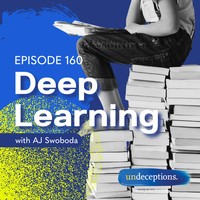

#1590
Mentioned in 24 episodes
On The Incarnation
Book • 2018
Written by St. Athanasius in the 4th century, 'On the Incarnation' is an apologetic treatise that defends the incarnation of Christ against non-believers.
Athanasius explains that the Word of God became incarnate to save fallen humanity, arguing that this act was necessary to undo the corruption of sin and restore humanity to its original state in the image of God. The book relies heavily on Scripture and the teachings of the early Church, addressing various objections to the incarnation and emphasizing the divine and human natures of Christ.
Athanasius explains that the Word of God became incarnate to save fallen humanity, arguing that this act was necessary to undo the corruption of sin and restore humanity to its original state in the image of God. The book relies heavily on Scripture and the teachings of the early Church, addressing various objections to the incarnation and emphasizing the divine and human natures of Christ.
Mentioned by




















Mentioned in 24 episodes
Mentioned by 



J.T. English

28 snips
Deep Discipleship with J.T. English
Mentioned by 



John Eldredge

24 snips
E858 | The Good Heart 2.0 - Part 1
Mentioned by ![undefined]()


Bob Hiller

23 snips
Nicaea Today: The Story Behind the Council of Nicaea
Mentioned by ![undefined]()


Bob Hiller

18 snips
The Theology of C.S. Lewis
Recommended by Daniel Hummel as a refreshing read, defending the Incarnation against critiques.

16 snips
Ep. 314 Daniel Hummel - The Rise and Fall of Dispensationalism
Mentioned by ![undefined]()


John Dickson

13 snips
160. Deep Learning
Mentioned by ![undefined]()


Derek Turner

12 snips
Thomas Jay Oord & Keith Giles / Deconstructing Hell
Recommended by Dr. Hannah Black as an approachable book for getting to know early Christian theology, noting the preface by C.S. Lewis.

11 snips
What is the Nicene Creed? PART 01 with Dr. Hannah Black, Ph.D.
Mentioned as the work in which St. Athanasius discusses atonement happening through the incarnation.

The Priest Shall Make Atonement
Mentioned as a book that John reads from to discuss the divine dilemma and its solution in the incarnation.

E853 | The Advent Obstacle
Mentioned by ![undefined]()


Alan Strange

179. The Councils of Ephesus and Chalcedon
Recommended by ![undefined]()


Sam Parkison

The Unvarnished Jesus: The Person of Christ with Sam Parkison
Mentioned by 



Josh White

Mary: The Favored One
Recommended by ![undefined]()


Joseph Lanier

Proclaiming the Triune God: The Trinity in the Life of the Church with Joseph Lanier
Mentioned by 



Gavin Ortlund

Which Atonement Theory is Right?
Mentioned by ![undefined]()


Nathan Jacobs

How the Devil Tried to Steal Christmas | The True Story of the Nativity
Recommended by ![undefined]()


Stephen Nichols

Ancient Wisdom
Mentioned by 



Jay Dyer

Jay Dyer / Jake Rattlesnake - Regime Change, CIA Manipulation, Kabbalah
Mentioned by ![undefined]()


Nathan Jacobs

Are Orthodoxy and Catholicism Fundamentally Incompatible? | Dr. Nathan Jacobs
Recommended by ![undefined]()


George Kalantzis

Did the Early Church Believe Jesus Was God?




